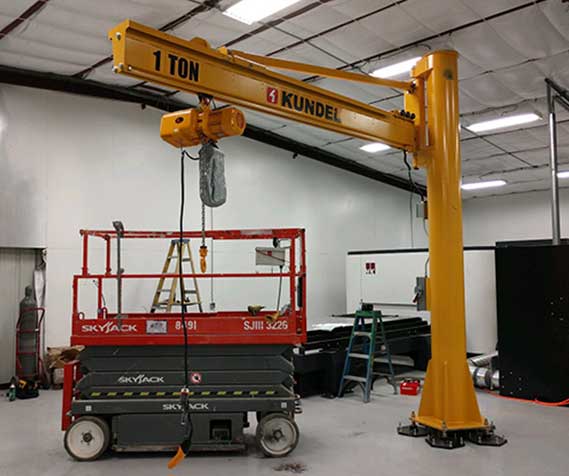As construction sites and industrial settings become more and more complicated, the need for cranes to support this complexity increases.
The use of cranes in construction has become an essential tool, both for their ability to carry heavy loads and transport materials to higher heights. Among the different types of cranes used in industrial and construction settings, industrial jib cranes stand out for their versatility, efficiency, and cost-effectiveness.
Let’s explore some of the advantages of using jib cranes in construction and industrial settings, how they compare to other types of cranes, and what a jib crane actually is.
What is a Jib Crane?
Firstly, what exactly is a jib crane in construction? A jib crane is a type of crane that has a horizontal arm, also known as a jib, which supports a hoist and a trolley. These cranes are known for their ability to lift and move heavy loads around their arc of motion with ease.
There are many reasons why construction workers and contractors love using a jib crane.
Jib Cranes Have a Wide Range of Movement
One of the most significant advantages of jib cranes is their range of movement. Unlike other cranes that may be restricted in their movement or range of motion, jib cranes allow for a 360-degree radius of movement, enabling operators to maneuver heavy objects and materials easily.
They can swing materials around corners, offloading and loading objects in tight spaces. This versatility makes jib cranes perfect for use in confined spaces and limited working areas, and significantly reduces the likelihood of accidents on the job site.
Jib Cranes Are Compact
Jib cranes are usually much smaller than other types of cranes, which means they can be installed in smaller workspaces that wouldn’t be able to accommodate larger cranes. Jib cranes can generally be mounted on walls, floors or columns and are easy to install, saving time, space, and money.
Jib Cranes Are Affordable
Compared to other cranes, jib cranes are relatively affordable, making them an ideal option for small to mid-sized companies or facilities that may not have the budget for larger, heavy-duty cranes.
Their affordability does not mean they are any less efficient or effective than larger cranes. In fact, they are often a better economic choice, costing less to operate and maintain, and requiring less manpower to operate.
Jib Cranes Offer Better Operational Control
Jib cranes provide better control over the load, with the operator being situated fairly close to the material, making it easier to maneuver objects in tight spaces.
The operator can adjust the lifting speed to ensure a smooth operation and prevent damage or accidents. Jib cranes, unlike other cranes, remain highly stable as they can be anchored and secured to a wall or column. Moreover, some jib cranes come equipped with sensors to prevent overloading, which helps to prevent accidents and minimize damages.
Jib Cranes are More Versatile than Other Crane Types
Jib cranes have a lot fewer restrictions on their use than other crane types. The uses of a jib crane include the transport of materials within a factory, warehouse, or workshop setting or for offshore rigging, port containers, and even for military applications.
Depending on the type of jib crane, they can be used in manufacturing, shipbuilding, construction, or with heavy machinery.
The Advantages of Using a Jib Crane are Wide and Varied
The widespread use of jib cranes in construction and industrial settings speaks to their efficiency and practicality. While they may not be able to lift as consecutively heavy loads as larger cranes, the benefits of jib cranes make them an indispensable tool in manufacturing, general construction, and maintenance operations.
If you’re considering the cost, versatility, and compact nature of jib cranes, you can easily decide that they are an ideal alternative to other types of cranes. These advantages highlight why jib cranes are a favorite among construction companies and industrial facilities that need an efficient lifting tool that can be versatile, cost-effective, and provide maximum operational control.

